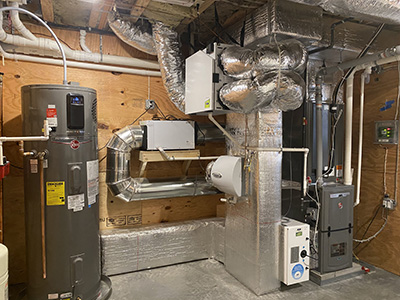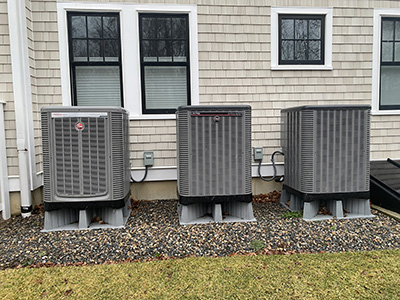Smarter Products, Better Performance
May 3, 2024


At Rheem® we continuously innovate products with sustainability in mind to reduce negative environmental impacts, energy use and customer utility costs. Our emerging leadership in smart connected products helps us deliver more comfort and convenience to consumers while playing an important role in electric grid stability and decarbonization.
Powered by EcoNet® technology, our smart connected products provide consumers control of their water heater and HVAC system from a smartphone via the EcoNet app. The EcoNet app provides real-time information—from service reminders to leak detection alerts—and allows homeowners to track trends in their energy consumption, giving consumers greater control over their water heating and heating & cooling equipment.
How Rheem Helps Utilities Maximize Demand Response
 Rheem offers a wide range of smart connected products, including energy-efficient heat pumps. Heat pump water heaters work as thermal batteries, storing hot water for hours. The equipment can operate during off-peak energy usage periods and still provide hot water when needed. Electric utility providers around the world employ these smart, high-efficiency products to reduce the burden on electric grids. Currently, many governments and utilities provide incentives for homeowners to install heat pump water heaters and participate in demand response programs.
Rheem offers a wide range of smart connected products, including energy-efficient heat pumps. Heat pump water heaters work as thermal batteries, storing hot water for hours. The equipment can operate during off-peak energy usage periods and still provide hot water when needed. Electric utility providers around the world employ these smart, high-efficiency products to reduce the burden on electric grids. Currently, many governments and utilities provide incentives for homeowners to install heat pump water heaters and participate in demand response programs.
Demand response programs help utilities manage the electric grid by shifting electricity usage to low-demand, off-peak energy usage periods. To reduce energy consumption during high-demand periods, utilities incentivize consumers with lower time-of-use rates. This enables utilities to supply continuous and reliable power to homes and buildings. Rheem’s smart connected products powered by EcoNet make connecting to and participating in demand response programs easy.
The installation of heat pump water heaters and connection to utility demand response programs helps governments achieve decarbonization and clean energy goals. By partnering with electric utility programs in the US, Canada and Australia and with state incentive programs like TECH Clean California to install millions of heat pump water heaters, Rheem hopes to accelerate the energy transition globally.
Bringing It Home: Machuga Labs
As the leader of Rheem’s smart connected products strategy, I wanted my new home to be a living laboratory of sustainable smart connected products. When building our home—which my family jokingly refers to as Machuga Labs—I prioritized features like indoor air quality, hot water availability and energy efficiency to ensure it would be as comfortable as it was sustainable.

I chose air conditioning, water heating and other mechanical products that improve quality of life and energy cost savings. Various tax credits and utility incentives made the products more affordable, and investing in these products from the start allowed for smart system integration. Our home has a solar array that is tied into the local grid, providing the opportunity to sell excess kilowatts to the utility, and several different heat pump applications ready to participate in our local utility’s demand response programs when offered. Until then, they are proving cost-efficient HVAC and water heating for our comfort.
While I’m proud to say my home is state-of-the-art, more importantly I hope it encourages others to install smart and efficient technology available from market leaders like Rheem. Using my home as a lab to test the smart capabilities of Rheem’s residential and light-commercial products, I’ve seen the benefits firsthand. Leveraging these innovative products in my own life has furthered my commitment to promoting the adoption of decarbonization solutions and helping Rheem lead at the crossroads of smart technology, connectivity and sustainability.

























